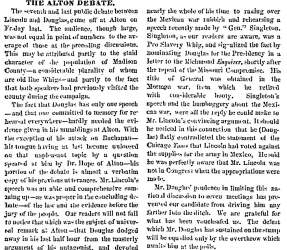Record Data
Transcription
THE ALTON DEBATE.
The seventh and last public debate between Lincoln and Douglas, came off at Alton on Friday last. The audience, though large, was not equal in point of numbers to the average of those at the preceding discussions. This may be attributed partly to the staid character of the population of Madison County – a considerable plurality of whom are old line Whigs – and partly to the fact that both speakers had previously visited the county during the campaign.
The fact that Douglas has only one speech – and that one committed to memory for rehearsal everywhere – hardly needed the evidence given in his mumblings at Alton. With the exception of his attack on Buchanan – his tongue having at last become unloosed on that unpleasant topic by a question speared at him by Dr. Hope of Alton – his portion of the debate is almost a verbatim copy of his previous utterances. Mr. Lincoln’s speech was an able and comprehensive summing up – as was proper in the concluding debate – of the law and the evidence before the jury of the people. Our readers will not fail to notice that which was the subject of universal remark at Alton – that Douglas dodged away in his last half hour from the masterly argument of his antagonist, and devoted nearly the whole of his time to raking over the Mexican war rubbish and rehearsing a speech recently made by “Gen.” Singleton. Singleton, as our readers are aware, was a Pro Slavery Whig, and signalized the fact by nominating Douglas for the Presidency in a letter to the Richmond Enquirer, shortly after the repeal of the Missouri Compromise. His title of General was obtained in the Mormon war, from which he retired with considerable booty. Singleton’s speech and the humbuggery about the Mexican war, were all the reply he could make to Mr. Lincoln’s convincing argument. It should be noticed in this connection that he (Douglas) flatly contradicted the statement of the Chicago Times that Lincoln had voted against the supplies for the army in Mexico. He said he was perfectly aware that Mr. Lincoln was not in Congress when the appropriations were made.
Mr. Douglas’s prudence in limiting this national discussion to seven meetings has prevented our candidate from driving him any farther into the ditch. We are grateful for what has been vouchsafed us. The defeat which Mr. Douglas has sustained on the stump will be equaled only by the overthrow which awaits him at the polls.





